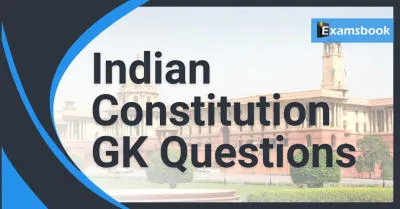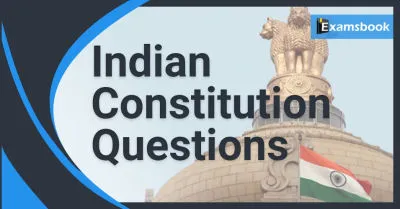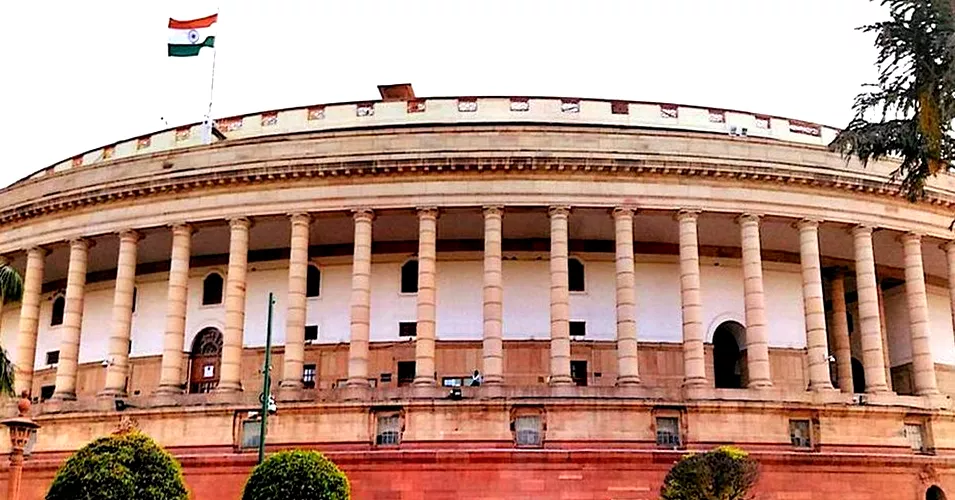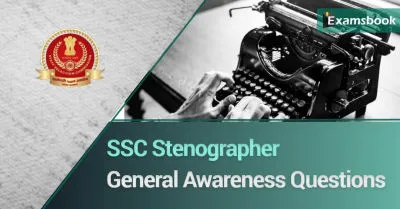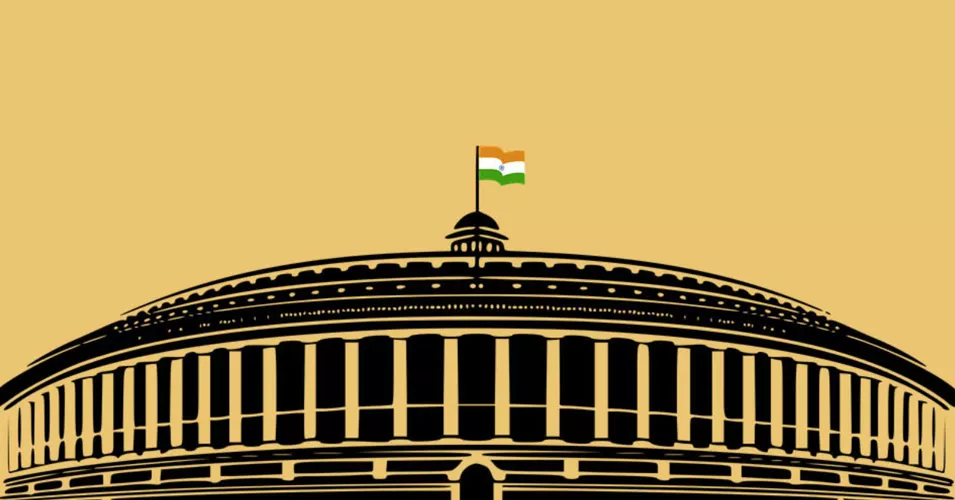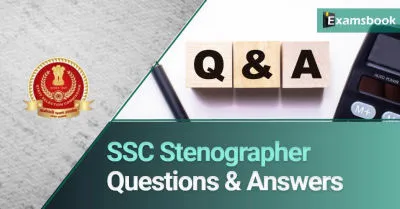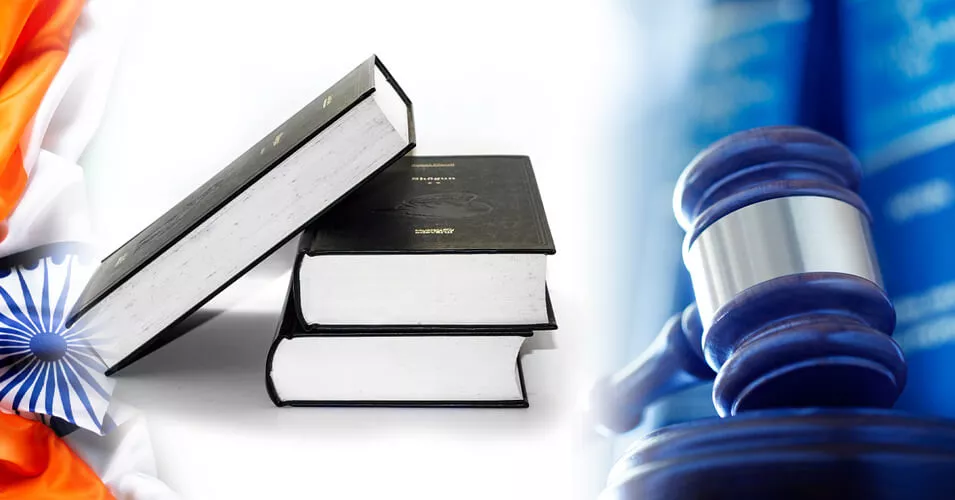- Free Test Series, Mock tests and Practice Tests
- Time proven exam strategies
- Exam analysis and simulated tests
- Hand-on real time test experience

Recently Added Articles View More >>
Welcome to our Constitution GK Quiz for Competitive Exams blog! This dedicated space is your go-to resource for mastering the intricate details of the Constitution of India whether you're preparing for UPSC, SSC, banking exams, or other competitive tests.
Welcome to our Constitution General Knowledge Quiz and Answers blog! Dive into the depths of legal history and governmental principles as we explore the foundation of our society through this engaging quiz.
Welcome to our comprehensive guide on tackling Indian Constitution questions for SSC exams. The Indian Constitution serves as the foundational document that governs the world's largest democracy, providing a framework for governance, rights, and duties of citizens.
Welcome to the Indian Constitution GK Quiz with Answers blog! Delve into the depths of India's foundational document with our engaging quizzes. Test your knowledge of the intricate details, historical significance, and key provisions of the world's lengthiest written constitution.
Welcome to our Indian Constitution GK Quiz blog! This Indian Constitution GK Quiz is designed to test your knowledge of the Indian Constitution, one of the world's most comprehensive and vital legal documents.
Welcome to our Indian Constitution Questions and Answers Blog, your ultimate destination for mastering the fundamental principles of the Indian Constitution. Designed exclusively for competitive exam aspirants, this platform serves as your comprehensive guide to understanding the bedrock of India's legal framework.
Welcome to our blog Indian Constitution Quiz Questions and Answers, where knowledge meets curiosity! If you've ever wondered about the intricacies of the Indian Constitution or simply want to test your constitutional prowess, you're in the right place.
Welcome to our Constitution General Knowledge (GK) Quiz with Answers, designed specifically for competitive exam aspirants! Understanding the foundational principles of a nation is crucial for any serious candidate.
Most Popular Articles
Most Popular Articles
Recently Added Questions
Which of the following amendments to the Constitution of India put a cap on the number of ministers in the Union Cabinet?
1.4K 0 6576f33ed994497b27ace771- 174thfalse
- 269thfalse
- 383rdfalse
- 491sttrue
- Show AnswerHide Answer
- Workspace
- SingleChoice
Answer : 4 91st
Explanation :
Clause 1A was inserted in Article 164 of the Constitution (91st Amendment) Act, 2003, according to which, "The total number of Ministers, including the Chief Minister, in the Council of Ministers of a State should not exceed 15% of the total number of members of the State Assembly.
- 11923false
- 21919false
- 31928true
- 41925false
- Show AnswerHide Answer
- Workspace
- SingleChoice
Answer : 3 1928
Explanation :
1. Simon Commission visited India a total of 2 times. For the first time, he came to India in February-March 1928, while for the second time, he came to India in October 1928. The Simon Commission submitted its report in May 1930 and the British Government published it on May 27, 1930.
2. Simon Commission had said in its report that the High Court in India should be kept under the Government of India. Furthermore, implementing accountable governance in the provinces should be initiated.
Which of the following Articles of the Constitution of India states that the State shall take steps to organise village panchayats?
1.3K 0 6572f06d612650bf535585b5- 1Article 48false
- 2Article 40true
- 3Article 36false
- 4Article 34false
- Show AnswerHide Answer
- Workspace
- SingleChoice
Answer : 2 Article 40
Explanation :
Article 40 was made and it became part of the Directive Principles of State Policy of the Constitution. However, the necessary legislation to bring the Panchayats into effect was not made immediately. Recommended the establishment of a three-tier Panchayati Raj system in the nation.
Which of the following Articles of the Constitution of India declares that the Supreme Court shall be a court of record?
1.3K 0 6572e9c1b56eebbf4791b4e8- 1Article 111false
- 2Article 135false
- 3Article 129true
- 4Article 119false
- Show AnswerHide Answer
- Workspace
- SingleChoice
Answer : 3 Article 129
Explanation :
According to Article 129, the Supreme Court acts as a court of record, that is, records are officially published and decisions are given on their basis, considering them as precedents. The decision given by him cannot be challenged in any court. The Supreme Court also has the power to punish for defamation.
Who among the following became the first Chief Minister of the National Capital Territory of Delhi in 1993?
1.3K 0 6572e137a1070fbf9bedc055- 1Madan Lal Khuranatrue
- 2Sheila Dixitfalse
- 3Sushma Swarajfalse
- 4Sahib Singh Vermafalse
- Show AnswerHide Answer
- Workspace
- SingleChoice
Answer : 1 Madan Lal Khurana
Explanation :
1. Madan Lal Khurana (15 October 1936 – 27 October 2018) was an Indian politician and former Chief Minister of Delhi from 1993 to 1996.
2. He was succeeded by Gurmukh Nihal Singh of the Indian National Congress, who held the post for just one year in 1955.
3. The States Reorganization Act, 1956 made Delhi a union territory under central control.



